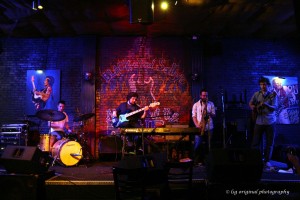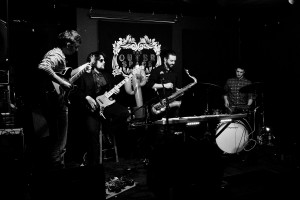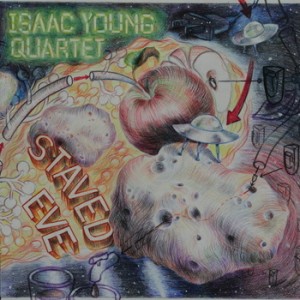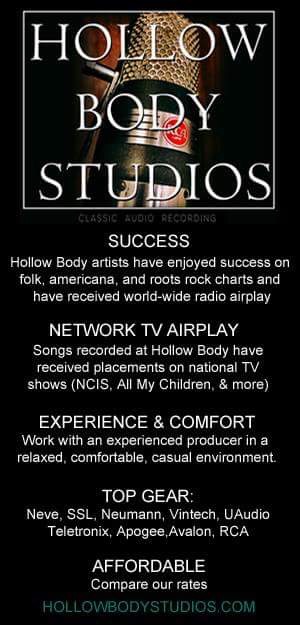 The Isaac Young Quartet has been nominated twice for a New England Music Award. The funk-jam band from Hartford, Connecticut is constantly lumped into the jazz category because their particular compositions are complex and challenging to play. Yet, the band’s namesake, Isaac Young, is still ecstatic about the dual recognition.
The Isaac Young Quartet has been nominated twice for a New England Music Award. The funk-jam band from Hartford, Connecticut is constantly lumped into the jazz category because their particular compositions are complex and challenging to play. Yet, the band’s namesake, Isaac Young, is still ecstatic about the dual recognition.
“It was a true honor,” Young said. “It was amazing because it was our second nomination. Actually, during the first nomination, I was getting my home inspected. I just bought a house last year. We got a phone call from someone who was like ’Hey, you’ve been nominated for this award.’ And the first year we were blown away. Just getting the nod from it two years ago was ago was a big enough honor. Then to get it for the second year in a row, we were all beside ourselves. It was a great statement that people are listening.”
Recognizing that his Isaac Young Quartet is not a mainstream band playing conventional pop tunes certainly made it even more of an honor to find wide spread support. Although there is jazz fusion technique in his funk-jam band’s composition and performance, at heart, they are rock and rollers.
“I grew up listening to a lot of The Grateful Dead and Led Zeppelin and Phish,” he said, “so a lot of improvisational rock where it wasn’t necessarily straight ahead jazz. I did grow up listening to Charlie Parker and Dexter Gordon. When it came to finding my personal voice and our personal voice as a band, because it’s not just me, it’s about all four of us, very collectively. We all are very like minded, and the idea of collective improvisation is more with a rock influence instead of just feeling swing or trace solos in the tradition of jazz.”
Young, who plays keyboards, saxophone, and Electronic Wind Instrument, also mentioned that their band’s drummer Steve Cusano likes hip hop productions like Flying Lotus and Jay Dillow. Bassist Jon Dostou admires Steely Dan while Young and guitarist Jesse Combs like Lettuce and Soulive. “We pull from all these different influences that aren’t only jazz-centric,” he said. “We try to combine all those into whatever this product is that we’ve created.”
Jazz fusion chops are not easy to learn. One always wonders if players from the fusion, jazz, progressive rock genres were the kids who never came outside to play. Young started piano lessons at age 5, classical training. By age 11 he was playing typical repertoire pieces by Chopin and Mozart. At nine, he picked up saxophone and taught himself how to play it. “I loved the freedom that that instrument allowed me. It was from that instrument that allowed me to start doing jazz,” he said.
Young and his band mates all went to the Hart School Of Music. Bassist Jon Dostou got his Masters at the Hart School after receiving his Bachelors’ at Berklee College Of Music. The others received their undergraduate degrees at Hart. A conservatory makes grueling demands on students.
“We’d sit there and practice for hours. I used to practice for 16 hours a day in college,” he said. “You wake up. You practice. You grab a very quick bite. You practice. You go to class. You practice. It was just constant. I think it was in those formidable four years that really honed my skills. I can’t speak for the other three. They always had the skills. They’re such phenomenal musicians, my goodness, just to play with them.”
Young’s idols and inspirations now include Lettuce and Soulive and others with modern takes on funk. Lettuce emulates the Tower Of Power horn section wall of sound. Soulive, too, is complex music that doesn’t require one to be a musician to understand.
“This, everyone can get,” Young said. “You don’t have to be a musician. You can just be someone who just enjoys sound. That’s what we try to do. We’ve been pulling a lot of influences from them.” Young also used to follow the band Phish around the country, and he incorporates that jam band approach “but with a little less aimless wandering musically,” he added.
 The Isaac Young Quartet’s latest album Staved Eve marks the first time all members had an equal part in the composition process. They wrote the songs long before they even considered going into the studio. They road tested the material for about year first.
The Isaac Young Quartet’s latest album Staved Eve marks the first time all members had an equal part in the composition process. They wrote the songs long before they even considered going into the studio. They road tested the material for about year first.
“We found that these were the core that stuck, that got really positive audience reactions,” he said. “We used that and tried to replicate as best as we could what happens live and what energy it imparts to an audience, in the studio. That was the big process for the creativity on this one, We wanted to make sure that the songs became natural.” They didn’t go into the studio with certain parts written in stone. It was not spontaneous entirely, but there were moments of improvisation. “We did multiple takes and chose the best ones,” Young added.
The complex, challenging improvisation music on Stave Eve makes one wonder how the composition process get its inspiration. It’s not much different, Young said, from other kinds of bands. He is working on a new song from the next album about his weekend in Maine. Other times it’s even more spontaneous.
“Sometimes it’s as silly as I’ll walk up to a piano and throw my hand at the keyboards and sometimes it sticks,” he said. “I know that if you take it from the academic sense of composition that is considered pretty blasphemous. ‘You should go in with a plan. You should go in with all this theory.’ But, sometimes it’s about the visceral reaction that that chord resonates with you. That chord really brings you to a certain place, and we build off of that.” Other times the band members play something inspired by each other’s idiosyncrasies.”
Lately, Young and Dostou have been writing in partnership. When one hit’s a wall, the other can pick up the ball and steer it in another direction. There is also, Young said, a good balance between each’s compositional mind set which “allows for a very well controlled compositional process, that doesn’t have months where you’re just staring at a blank piece of paper.”
One of the most striking tunes on Staved Eve is “It’s Nacho Time.” It features sustained notes on the keyboards that carry well. Young invented it spur of the moment at a live show. He had been invited to play a last minute show, and he couldn’t get his usual band to make it. He had a substitute crew on stage with him when the show’s technical director said they had time for one more number.
“The problem was, we didn’t have one more,” Young quipped. “So we decided to just make something up, and it ended up being a lot of what that song is. It was just a happy accident on stage, the right energy, the right time. And luckily, someone recorded the show. I was able to then grab the recording afterwards, and we decided to take that song and craft it into what it is today. That was all because of that one moment on stage.”
The Staved Eve album suddenly shifts gears to the mellow groove vibe of “Steve N Dave.” There is a cool sax line written by bassist Jon Dostou based on a deep seated inside joke within the band. It also came after a nine hour session that left the band exhausted.
“It was one of those moments where you’re a little too tired to be functioning but you can still play,” Young admitted. “You’re almost falling asleep, that hazy feeling, and that’s what inspired that sound was the fact that we were all kind of burnt out from the take. But, I think, it captures the right feel for that song, that kind of smoky club feel.”
The Isaac Young Quartet began playing out in their fertile, supportive Connecticut music scene. They’re based out of Hartford, and the home crowd gave them such a boost that they‘ve moved into other markets. Last week, they were in New York City. Next week they’re going to be at a festival in Glastonbury. They’ll also soon play in Portland, Maine and Portsmouth, New Hampshire before returning to Connecticut for a Putnam gig. Next year, IYQ will be heading south toward Maryland and the Carolinas.
 Young said his home state of Connecticut is the best, most supportive music scene in the country at this time. He can say that with authority because he just came back from a national tour with Daphne Lee Martin, the masterful composer, vocalist, arranger, musician who has become the crown jewel of their state. “Going to Nashville and New Orleans and Baton Rouge and Huntsville Alabama, all these places that are big epicenters for art, in Connecticut there’s something different here. The community is simply that, yes, we can work. I can sustain a living though what I do,”
Young said his home state of Connecticut is the best, most supportive music scene in the country at this time. He can say that with authority because he just came back from a national tour with Daphne Lee Martin, the masterful composer, vocalist, arranger, musician who has become the crown jewel of their state. “Going to Nashville and New Orleans and Baton Rouge and Huntsville Alabama, all these places that are big epicenters for art, in Connecticut there’s something different here. The community is simply that, yes, we can work. I can sustain a living though what I do,”
Bands in Connecticut work together, not against each other, even though they’re not the same genre bands. “We don’t compete with each other. We support each other,” he said. “And there’s something very beautiful about that,” Young said. “I’m playing a show, and in the audience are members of the some of best death metal bands and hip hop bands. It’s not like you’re only sticking to the genre that you are representing. I recorded with 1974. They’re a prog group. We played shows with folk guys. It doesn’t matter. We don’t hold our community here to genre specific. That’s what makes our area so great is that no only do you have the ability to play multiple nights a week with no problem and draw crowds, you could sit there and fit in and plays shows with bands that normally on any other give day, you wouldn’t pair with on the same billing.”
Young said the three biggest cites for music are Hartford, New Haven, and New London. He plays and records in all three towns. Hartford, in the 1970s, became a huge jazz city, being the half way point between Boston and New York City. And New Haven is the city where Jim Morrison was arrested for inciting a riot back in the late 1960s.
“The music scene out here in the past nine years has exploded,” Young said. “It’s been remarkable. Every night of the week you can go see music out here. In New Haven right now, the big ones are Toad’s Place, Stella Blues, Anna Liffey‘s. You have within a four miles radius, you have ten or 12 places that you can bounce around.”
Because the Connecticut scene is so fertile, Young didn’t have to look far and wide to find Jon Dostou, Jesse Combs, and Steven Cusano. “The band wouldn’t be anywhere without them. Those three guys are just phenomenal,” Young exclaimed.
Their immediate goal is to finish their new album which is mostly written then to record it then tour more extensively. “We do short runs right now, and the reason we do is because both Steve and Jesse are still finishing up their degrees,” Young said. “Once they’re out of school, we’re going to try to tour more extensively. We’d love to do the big festival circuit, all the really, really big jam band festivals.”
The Isaac Young Band has a shipload of talent and a shipload of ambition. It will be fascinating to see how far they can take their instrumental funk-jam sound.

